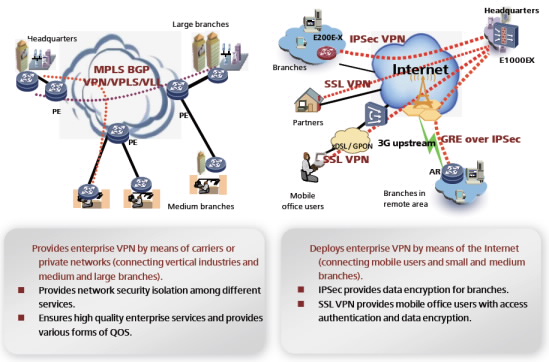As enterprise information networks develop, users can obtain abundant applications and data resources from enterprise intranets, and remote access demands are also increasing. For example, users in branches, staff on a business trip, SOHO users, partners, and customers of an enterprise need to connect to the enterprise campus network through the public network. The complex network topologies, diversified access scenarios, and numerous IT applications make it difficult to protect campus network security. Employees, partners, and customers expect to gain access to enterprise internal resources and data from anywhere at any time, and enterprises expect to control remote access, which bring challenges to campus networks.
The Huawei VPN solution adopts tunneling and encryption technologies to build virtual private networks that are associated to the Internet. This solution is cost-effective and features secure interconnection. Therefore, it is widely accepted among enterprises. The Huawei VPN solution integrates a series of mature security gateways and VPN modules, such as the VPN Client and VPN Manager, to provide advanced remote access solutions to large and medium enterprises, operators, and financial institutions.

Highlights:
Comprehensive VPN Network Construction Solutions.
- Huawei provides a complete set of VPN gateways, from desktop gateways for small offices/home offices (SOHOs) to large-capacity gateways for distributed offices. The gateways have been certified by UL, CE, FCC, and Security Specification in China, Europe, Australia and some other countries and regions.
- The Eudemon200E-X series gateways support various access modes: E1, cE1, SA, ADSL, and 3G.
- The VPN Client, professional client software, which provides friendly GUIs and strict but flexible security policies, is used to ensure easy and secure access to VPN networks.
- The VPN Manager, which provides friendly GUIs and powerful deployment and management functions, is used to ensure unified deployment and management and reduce deployment and maintenance costs.
Rich Functions to Satisfy Various Networking Requirements
- Provides various IP VPN access modes such as L2TP, IPSec, GRE, MPLS and SSL.
- Supports multiple encryption algorithms such as DES, 3DES, and AES.
- Integrates IPSec VPN with MPLS VPN to provide flexible and secure networks.
- Provides simple SSL VPN access. By means of APs, a user can use a standard Web browser to access the enterprise's intranet. Provides end-to-end hierarchical protection such as powerful authentication, fine-grained access control to the intranet resources, and encryption algorithms like DES, 3DES and AES.
- Virtualizes a physical gateway into multiple logical ones that have the same functions of the physical gateway and support private network address overlap and preserve independent VPN routes and forwarding entries to ensure service security isolation.
Effective SSL VPN Authentication to Guarantee Secure Access
- Supports remote access to applications in the enterprise intranet by means of SSL VPN.
- Supports the What You See Is What You Get (WYSIWYG) function for remote access to the Web through terminals.
- Supports security access to Web servers, shared files, and internal applications.
- Supports access to all services by means of VPN tunnels.
- Supports user authentication by user name and password.
- Supports mainstream authentication methods such as Radius, LDAP, SecurID, X.509 digital certificate and USBKEY + digital certificate.
- Provides system logs, administrator logs, and user access logs.
Huawei remote access security solution helps build an efficient, flexible, convenient, cost-effective, and secure virtual private network to meet the requirements for secure remote access and data sharing. This solution improves enterprises' business efficiency, ensures secure real-time information transfer, and enhances enterprises' competitiveness.

